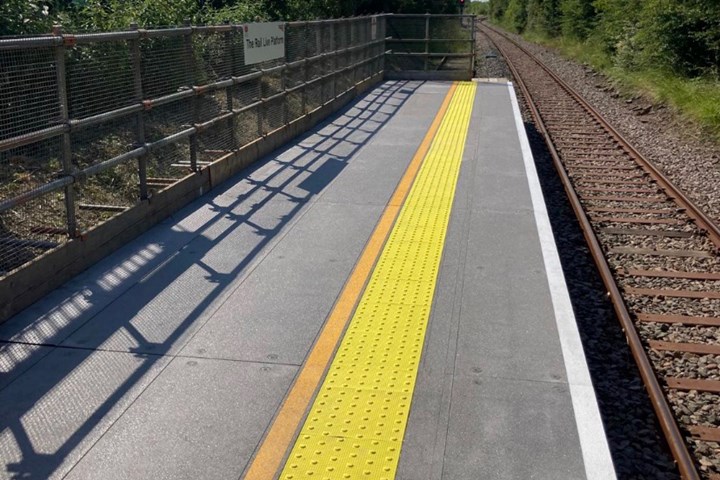Dura Platform features anti-slip surface composition
Tri-Tone Grit increases the slip resistance and natural look of Dura Composite’s fiberglass panels for rail applications, as depicted by their installation at Honeybourne Station in the U.K.
Dura Composites (Clacton-on-Sea, U.K.), has updated its award-winning composite Dura Platform, ideal for new build and refurbishment train station platform projects. The high specification Tri-Tone Grit surface composition, a new addition to this product, is said to provide a more natural finish in keeping with U.K. stations and also offers improved anti-slip for high footfall applications, in addition to improved visual resistance to everyday dirt and grime.
The modular, lightweight, glass fiber-reinforced polymer (GRP) panels do not require heavy plant machinery to maneuver, cutting platform installation time by up to 65%, reducing disruption and saving labor costs for rail contractors.
Against the Network Rail specification for slip resistance of 55 PTV, Dura Platform with Tri-Tone achieves dry figures of 78 and wet figures of 68 after 1.1 million footfalls, maintaining 97.5% of its original slip resistance. Results from independent testing show that the Tri-Tone surface delivers a 4% increase in slip resistance performance in dry conditions and 8% in wet conditions versus the previous generation Dura Platform surface.
Dura Platform passenger walkway panels have recently been installed for the first time at Honeybourne Station in Worcestershire, U.K., in collaboration with Sisk and Network Rail. The lightweight but structural panels feature integral lines and recessed tactile plates, and are being used for the temporary platform used to deliver the shuttle service to this year’s Rail Live exhibition. Following the exhibition, the panels will be transported to future sites across the Wales and the Western route, including a relocation to Barmouth to enable a temporary school shuttle service.
Approximately 30,000 m2 of Dura Platform panels are already in use across the U.K.
Related Content
-
CirculinQ: Glass fiber, recycled plastic turn paving into climate solutions
Durable, modular paving system from recycled composite filters, collects, infiltrates stormwater to reduce flooding and recharge local aquifers.
-
ZEBRA project demonstrates closed-loop wind recycling system
Consortium partners have proven the complete recycling of thermoplastic wind turbines via two manufactured wind blades, featuring reduced operating cost, CO2 emissions.
-
Composite wrap system combats corrosion in industrial tank repair
A fiberglass and carbon fiber composite wrap system enabled an Australian nickel mine to quickly repair a stainless steel ammonium sulphate feed tank and protect against future corrosion.
















